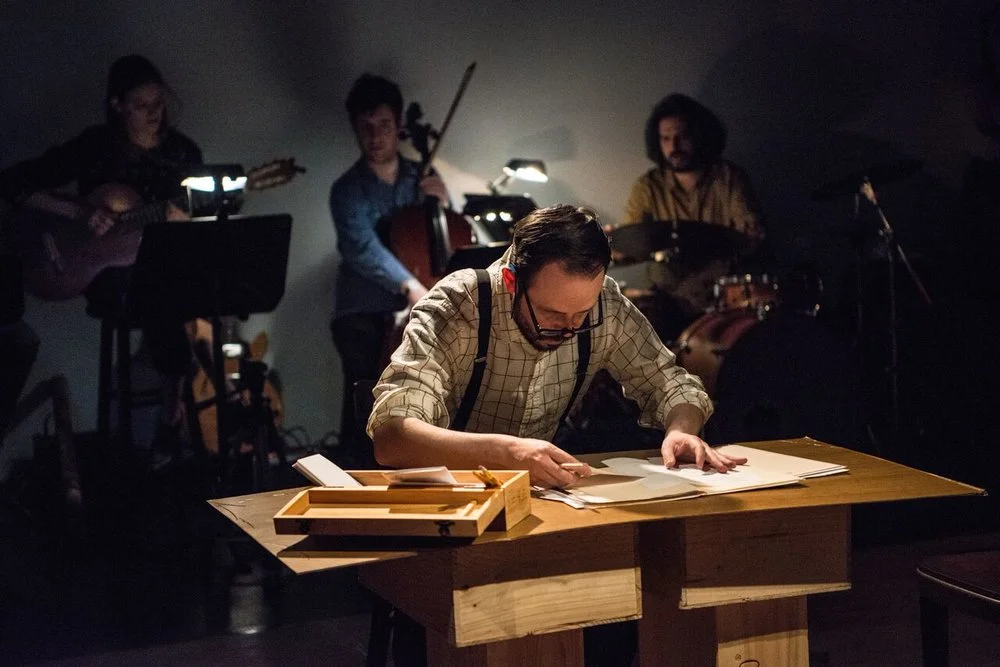El Pájaro Azul
Theater is a uniquely collaborative art form, uniting the widely disparate talents and focuses of often dozens of individuals to create one fully realized spectacle for the audience. It can often feel like the various contributors – actors, technicians, designers, writers, choreographers – are speaking different languages. But what if we took that idea a step further? Really leaned into it?
Azul Otra Vez (Blue, Revisited) is “part musical, part adaption, part play with music surrounding Ruben Dario’s life and work. The piece combines the author’s fictional characters and biographical elements into one tale about a poet in turn of the century Latin America struggling to make his art and his identity in a post-industrial world: a time of cultural change, immigration and economic fluctuation, not dissimilar to the one we are living today.” The book, by Melís Aker, is in English, while the lyrics, by Jacinta Clusellas (sometimes adapted from Dario), are in Spanish (with simultaneous English translation). The music, a jazz and folklore fusion, serve as a third language of sorts.
I spoke with composer Jacinta Clusellas, a co-creator of the piece, soon after a recent showing of Act I of Azul at BRIC.
What do you mean by "bilingual theater?"; Would you say theater is an inherently bilingual/multilingual artform?
We think of music as the third language in this piece. Writing music for Rubén Darío's poetry has been an interesting journey towards finding musical ways to express our own interpretations of his words. Given that music is a universal language, audiences have had very positive responses so far: English speaking audiences have shared with us that even though they could not understand the lyrics, the music made them travel and told them a story.
What inspired you to explore the multilingual experience in this way?
The challenge of creating a multilingual experience that feels natural is very exciting. Many of us live multilingual lives, so creating experiences and art that reflects our own lives feels meaningful and honest.
Why the story of Ruben Dario? And why did it need to be told this way? When did music become part of the project?
I first got inspired by Rubén Darío's work when I read his short story "El Pájaro Azul" (The Blue Bird) 4 years ago. I recorded a full album based on this story, and his poetry has been in my life ever since. Creating a play that expands on the album I recorded in 2015 has made my relationship to his work deeper and even more meaningful. The stories of this poet/artist struggling to create his art back in the 1890's are extremely relatable to our struggles nowadays.
What are your own stories of coming here? How have your experiences shaped your art? How have they shaped this project in particular?
The idea of leaving home and creating a new home far away from the place that we come from is something that so many of us can relate to nowadays, especially in NYC. I left Argentina, my home country, back in 2011 when I was 21 years old to pursue music and I feel that "leaving" has changed me and made me grow in so many ways.
Being away from home and creating lives which are different from the ones we would have in the places we were born, keeps us always changing, expanding and questioning our decisions. Rubén Darío's life and work reflects this changes, questions and adventures.
What's next for this piece?
We are going into the studio! We will be recording the music in 4 separate recording sessions, including 12 singers and 6 instrumentalists: clarinet, cello, guitar, piano, bass and drums. I am very excited to record this music for the first time and expand on my arrangements and ideas at the studio.
We are also working on the second act with Melis Aker (the book writer) coming up with new ideas, characters and connecting these stories more and more to our own lives and experiences.
Jacinta Clusellas performs "El Pájaro Azul" (The Blue Bird)







